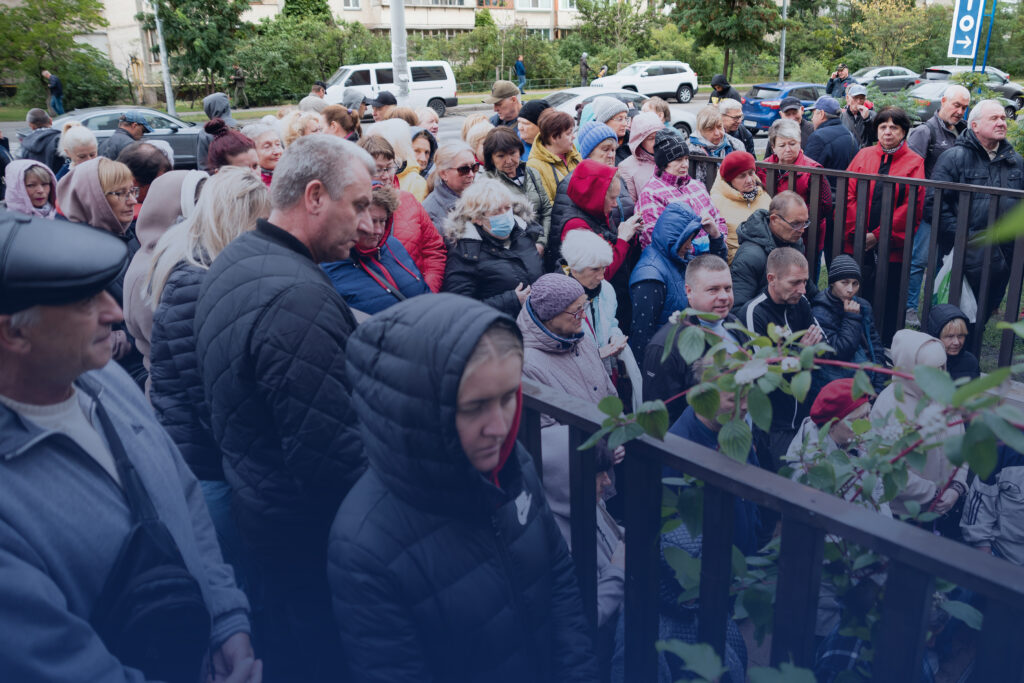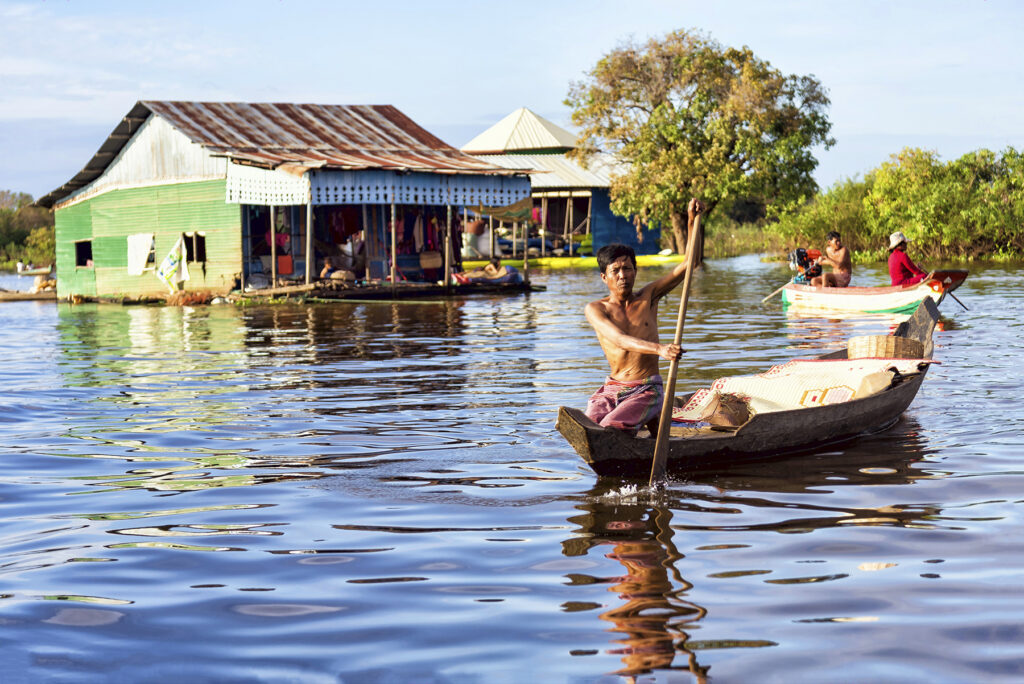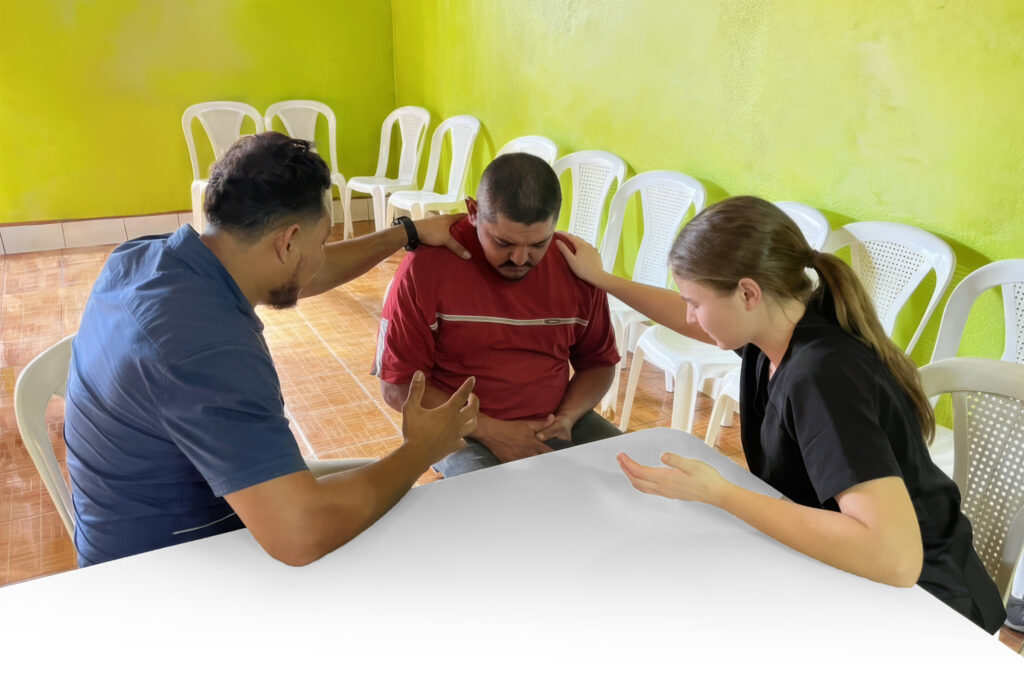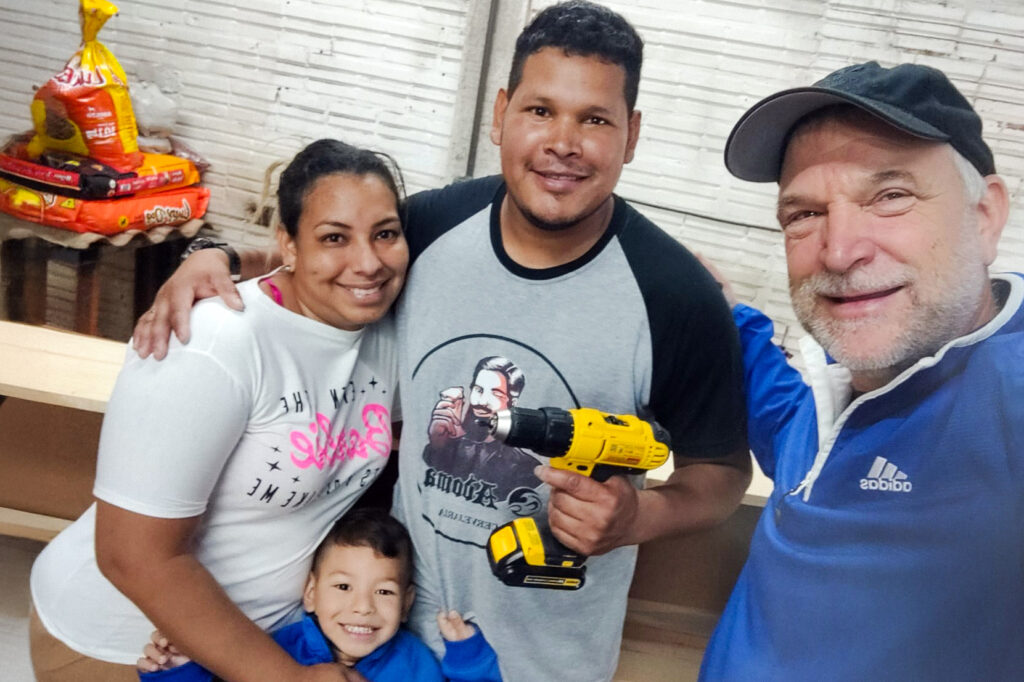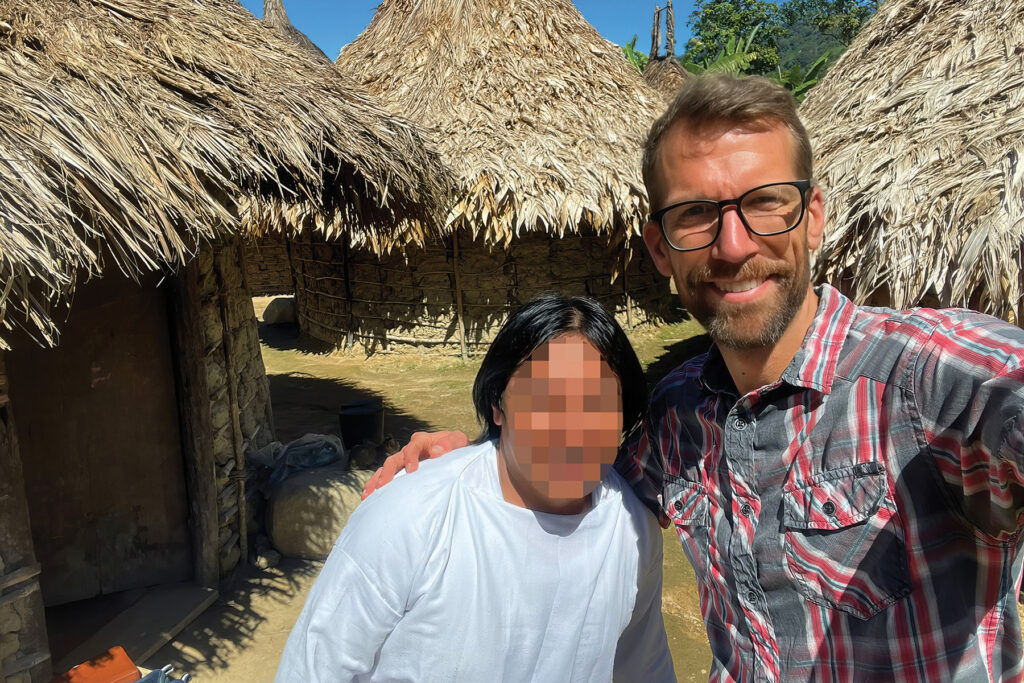As the Russian military offensive battered cities across Ukraine, countless Ukrainians faced an excruciating choice: to stay in their current cities under threat of destruction, or to leave families, homes, and the lives they knew to flee to safer cities in western Ukraine or other European nations.
After the first six months of war, a staggering 6.8 million Ukrainians were dispersed throughout Europe, with an additional 6.6 million internally displaced, according to UN reports.
Among them were eight ABWE missionaries serving in Kyiv and Odesa—some for decades.
With the first air raid sirens still ringing on the morning of the invasion, ABWE missionary Rich D. drove from his home in Moldova to the Ukrainian border to receive the ABWE colleagues evacuating from Odesa. Amid grief, shock, and turmoil, they jumped into ministry alongside Moldovan national partners to assist the Ukrainian women and children flooding across the border. In addition to Ukrainians, they provided transit housing for hundreds of evacuating international students from India, Africa, and the Middle East.
Their ministry later continued in Romania and is echoed throughout Europe as ABWE missionaries and national partners work tirelessly to serve those enduring war within Ukraine and those escaping as refugees into surrounding European nations.
“It’s an emotional roller coaster,” explains Mike G., ABWE Ukraine team leader. “The reality is that we’re in the middle of a war. But spiritually speaking, it’s been very fruitful. Churches are full like they never were before. God is saving people.”
ABWE missionaries are employing creative means to show the compassion of Christ in wartime conditions—and Ukrainians are responding.
Ukraine: Not Forgotten by the Church
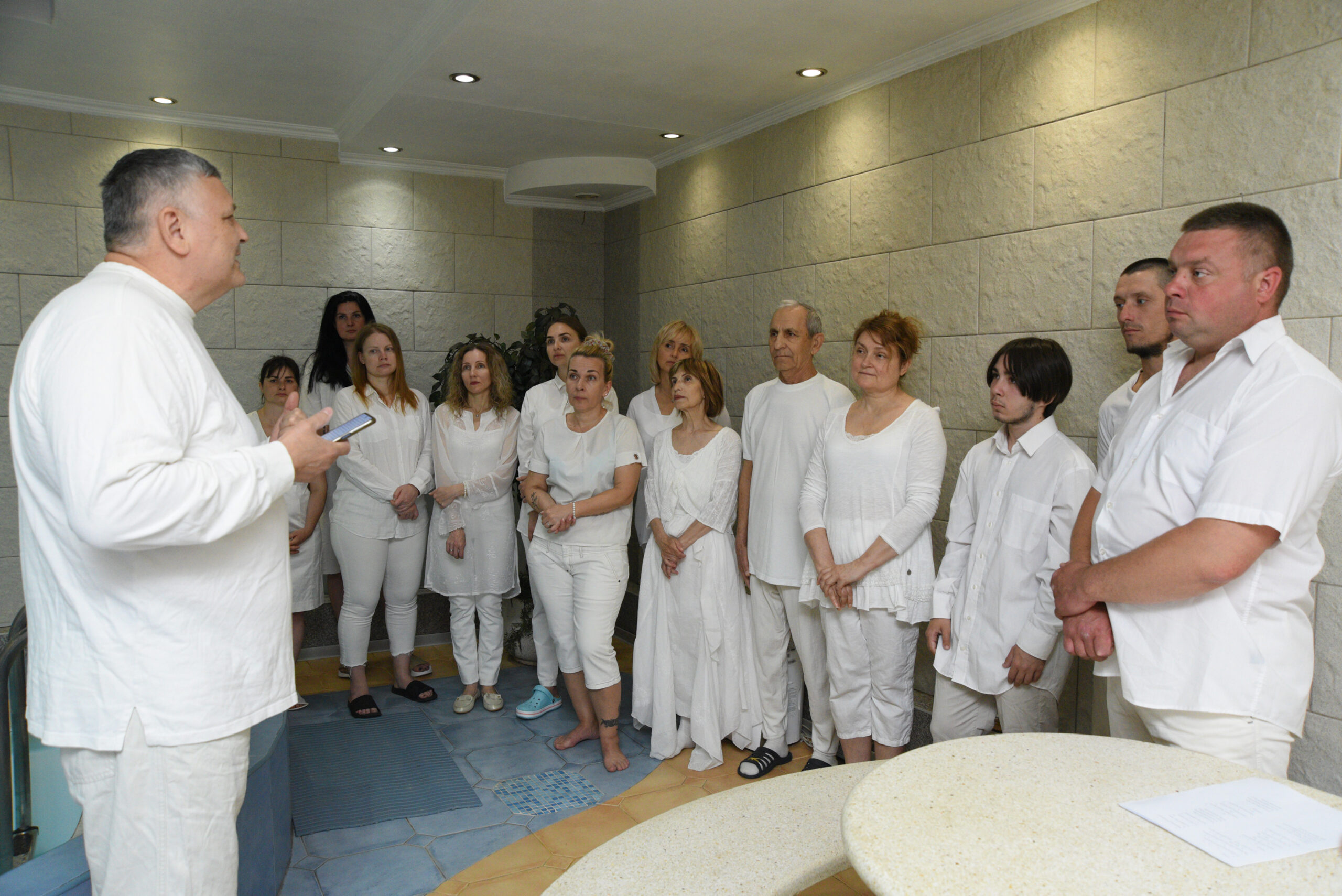
God’s Design Church in Kyiv baptized 19 new believers this summer.
Even while evacuated, the ABWE Ukraine team has remained focused on equipping and encouraging national partners.
One of these partners is Pastor Zhenya, of Bible and Life Church in Kyiv, Ukraine. Saved after watching the Jesus film as a youth and raised in Bible and Life Church soon after its founding by an ABWE missionary, Zhenya had recently graduated seminary when the war began. He was required to remain in Ukraine, like most men ages 18 to 60 able to contribute to the war effort, but made the difficult decision to evacuate his wife and small daughter.
As Russian forces withdrew from Kyiv in mid-April, Zhenya and church leadership strategized how they could help the thousands of internally-displaced Ukrainians who resettled in Kyiv after fleeing Mariupol, Kharkiv, Kherson, and other areas devasted by shelling. Bible and Life Church began holding an outdoor service on Thursdays that included a children’s program and distributing food packets. With widespread unemployment due to the war, attendance soon reached 300 each week—a total of over 4,100 during the first six months.
“People are looking for community. People are looking for fellowship. They’re looking for people to pray with them and just listen to what’s going on in their heart and head,” Mike G. says.
Through outreach by Bible and Life Church, many have turned to Christ—including Zhenya’s mother, whose resistance to the gospel softened through the hardships of COVID and war. She was baptized by Zhenya in August.
Other Ukrainian churches report a similar response. God’s Design Church began meeting daily on the street to sing, share the gospel, and pass out food and hygiene items. This summer they baptized 19 new believers, with another baptism planned before winter. When their congregation doubled in size, they searched for a larger, underground facility that would accommodate everyone even during air raid sirens.
Crossroads Church in Odesa also recently baptized 13 people as community members found hope in Christ through evangelistic services, hot meals, and Bible studies. “The church is full every Sunday,” notes ABWE Ukraine missionary Holly F. “It is a joy to begin seeing lasting fruit coming from the ministry to physical needs.”
Meeting physical needs remains a crucial way of demonstrating Christ’s love as necessities are scarce and devastation continues. The Ukraine Crisis Fund undergirds national partners, helping supply food, fuel, ministry vehicles, rent for church facilities, and shipments of medical supplies. “These brothers and sisters are so thankful that the church has not forgotten them and is helping them. They’re daily facing strangers and giving them hugs and showing the love of Christ, and we’re able to help make that possible,” says Mike G.
At the same time, Ukrainian believers need prayer as the heartbreak of war drags on. As voiced by one national partner displaced from a city now under occupation: “[Pray] that God would give us peace in our hearts, strength to keep living, show us himself and how to find what we need, help us survive this grief.”
Romania: ‘The Lord Provided All the Way’
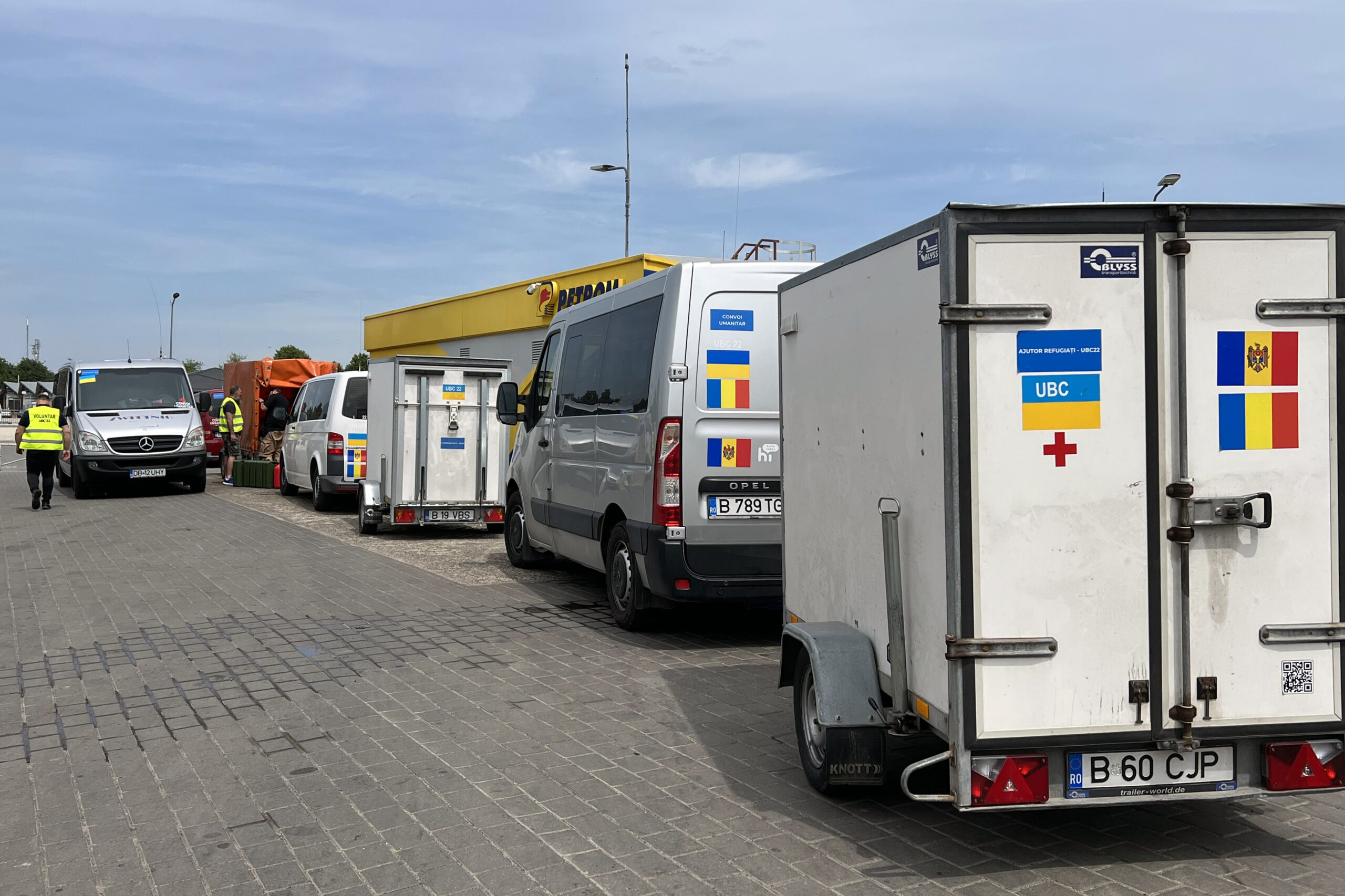
Ministry partners in Romania send convoys of humanitarian aid into Ukraine.
In Bucharest, Romania, a group of six churches and two organizations, including ABWE, combined staff and resources to unite as Ukrainian Bucharest Churches ‘22 (UBC22).
“On February 27, we held a Zoom meeting to figure out what to do if we saw refugees coming here to Bucharest. And refugees arrived on our doorstep that Monday morning,” recalls Chris Guess, ABWE missionary to Romania.
UBC22 quickly set up humanitarian centers in their churches, using every available space to install beds, showers, washers and dryers, and kitchen facilities. From the beginning, they had a rush of volunteers—over 900 people served with UBC22 during the first six months, helping accommodate 3,500 refugees. Volunteers sacrificed time and even jobs to fill roles as receptionists, cooks, or translators, or to provide counseling or help with transportation and legal paperwork.
“For the church to say as one voice, ‘Yes, this is important, this is what we’re doing’—it’s good to see some walls break down and the church be unified in honoring Christ by serving refugees,” says Chris.
Volunteers seek to make personal connections with each Ukrainian guest, listening to the heartbreak and needs of many who have lost everything. All are invited for prayer and worship services. Romanian pastor Sorin Deac explains, “The gospel is the engine of what we do. From day one we realized that we get to . . . embody the gospel by serving these people.”
Knowing that God’s Word does not return void, UBC22 staff imported Russian-language Bibles and children’s Bibles for Ukrainians to take with them on their journey. “People that never touched the Word will accept it because it’s a gift, and then you see them reading it later,” says Chris.
The ministry of UBC22 goes beyond hosting short- and long-term refugees, extending into Ukraine through convoys delivering food and critical supplies. UBC22 identified churches in Ukraine with whom they could partner, drawing on existing relationships through ABWE and a Romanian network.
“We’re thinking long-term,” explains Chris. “The desire is that we would not just deliver food but build relationships.”
Each convoy of vans carries 10 tons of food staples and water, along with containers of fuel and supplies requested by Ukrainian churches—often water filters, first-aid kids, or tourniquets. Once in Ukraine, local ministries transport the supplies farther into active war zones in the east or south. On the return trip, UBC22 convoys pick up Ukrainians waiting to evacuate to Romania. After six months, UBC22 had made 27 convoy trips.
“It’s been neat to see the Lord provide all the way,” Chris shares.
Hungary: A Window of Opportunity
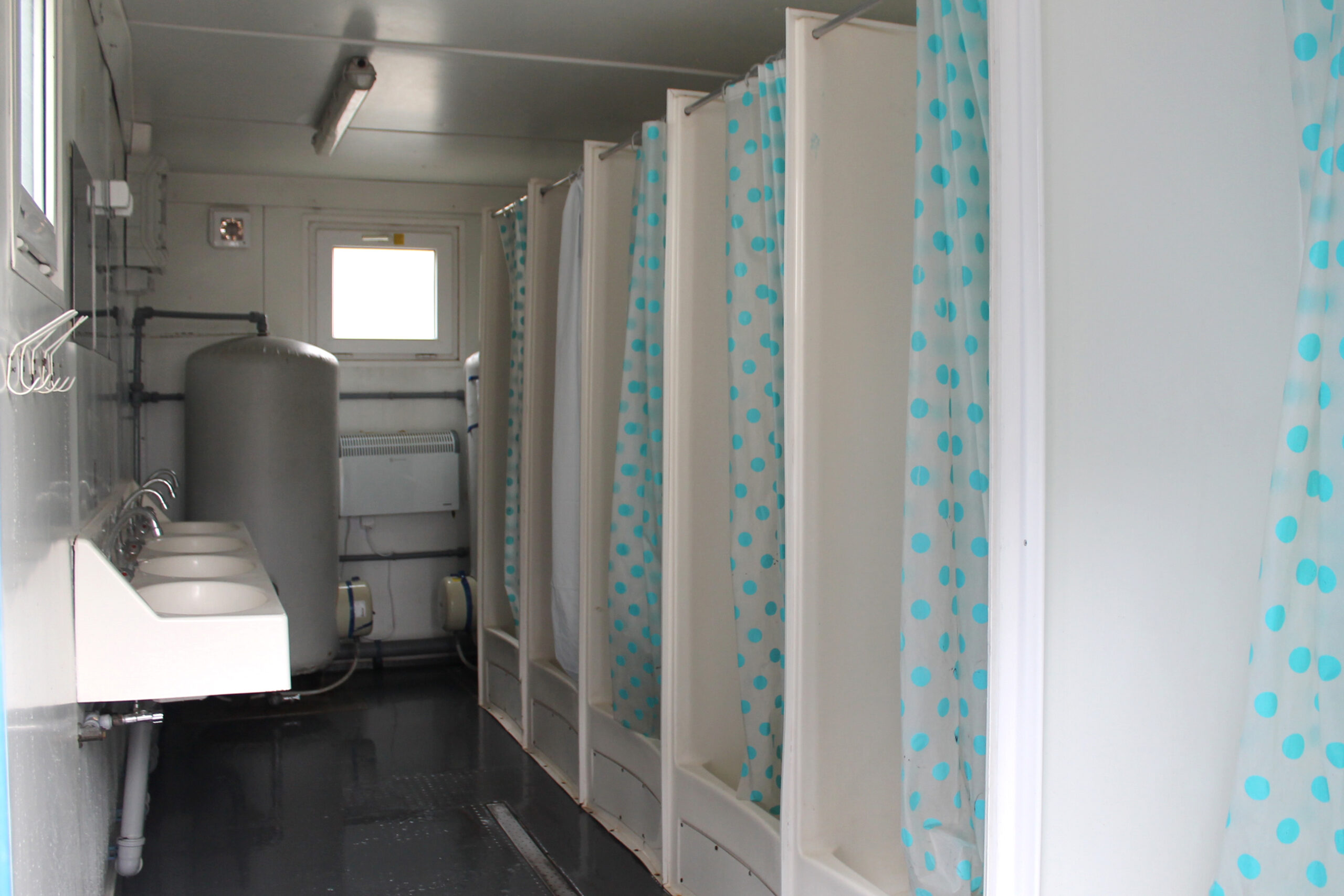
With help from the Ukraine Crisis Fund, Erd-Parkvarosi Baptist Church rented a shower container to increase their capacity for hosting refugees.
Other Ukrainians crossed the border into Hungary, pouring into the Budapest train station where masses waited in freezing cold to buy tickets onward to Western Europe—without anywhere to stay overnight.
“The war started on Thursday. On Sunday, some people gathered at the front of our church to organize what resources we had and who could help,” recalls Beth Hafer, ABWE Hungary missionary and member of Erd-Parkvarosi Baptist Church.
The church collected mattresses to furnish a makeshift living space in the basement of the church, while the city offered use of a community center across the street for additional housing. Finding that capacity was limited due to a lack of showers in the community center, they had the idea to rent a shower container, with help from the Ukraine Crisis Fund. Once set up beside the church building, the container provided six showers, sinks, and hot water boilers. The church later rented another container to use as an apartment.
Volunteers from the church and community were on call 24/7 to receive refugees, prepare food and bedding, and purchase tickets for those in transit to other nations.
“Everything changed minute by minute,” explains Beth.
Most refugees passed through for a night or two, while others stayed longer to apply for visas. Many carried belongings hastily packed in bags and, through tears, showed photos on their phones of houses destroyed and loved ones killed or left behind. One grandmother arrived with three other ladies from her family. She had left seven sons and two grandsons in Ukraine.
“When I showed her the fridge full of food, she just grabbed me and hugged me,” shares Beth.
Another young lady who stayed at the center for several days marveled, “I’ve never seen people love like this: people loving and caring for us who don’t have a reason to.”
“We have this one little window of opportunity to share with people,” Beth continues. “We want to put hands and feet to the love of Christ and pray that wherever we send people on to, God will use this.”
Bulgaria: Hope in Transit
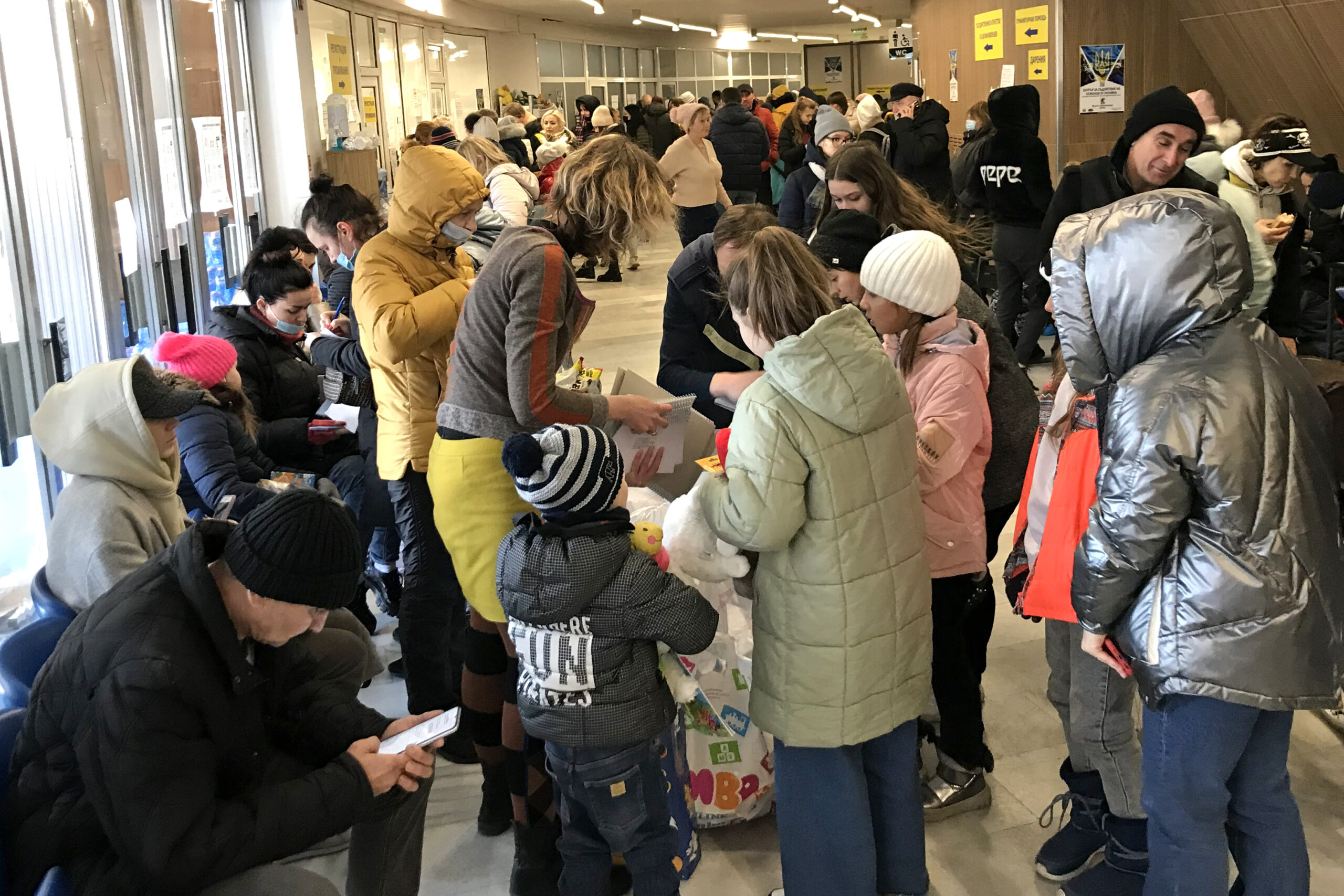
With the city refugee center overcrowded, a church in Varna, Bulgaria converted space in their building to house refugees.
In Bulgaria, a church stepped in to provide transit housing that government centers could not.
“We would sometimes get a call at 11:30 at night, ‘Hey, there’s a mom and baby with nowhere to go—can you come get them?’” describe Phil and Angela Flowers, ABWE Bulgaria missionaries. As their coastal city of Varna became the entry point for Ukrainian arrivals in Bulgaria, Varna’s population swelled with a 10 percent increase, overwhelming city resources. In response, the Flowers and Christian Evangelical Baptist Church converted space in the church building into a center that slept 17, with additional housing in apartments and the Flowers’ office.
Trains arrived daily at 8:00 p.m. The refugee center would record new arrivals, then call the church. “We were the city refugee center for those staying one night. If we didn’t put them up, they slept on the floor at the sports hall,” Phil explains.
Other Ukrainians settled into Varna for longer periods. To assist them, the church provided school supplies for children, free Bulgarian lessons, and medical supplies—along with outreach movie nights showing Pilgrim’s Progress dubbed into Ukrainian. “There’s no way our church could do refugee ministry without the Ukraine Crisis Fund,” conveys Angela.
One Saturday night, while picking up a van load of Ukrainians at the train station, a lady shared through a translator that her nine-year-old son had a physical disability. Phil contacted a Bulgarian physical therapist in the church, who agreed to examine the boy after Sunday services.
When the therapist reported that the boy would lose movement in his arms and back if he could not continue physical therapy, the church responded. The family moved in with the pastor and his wife so their son could receive extended care. Overwhelmed with thankfulness, the family attended an evangelical Russian-speaking church the next Sunday.
“I have a question,” the mother asked after the service. “We’ve been going to Orthodox church our entire lives. Why is it we come to this church one time and we understand the Bible for the first time?” She requested a Bible so her family could start reading for themselves.
Even in meeting basic human needs, God is working. “We keep hearing, can you help us find a church like your church once we’re back in Ukraine?” the Flowers add.
Poland, Slovakia, and Beyond
ABWE launched a new team to Poland this spring to minister to Ukrainians in Gdansk. Poland has received more Ukrainian refugees than any other nation, with 1.3 million applying for residency, according to UN reports.
ABWE team leader Ron Davis works directly with a Ukrainian national partner, Pastor Maksym, in a church with a Ukrainian-majority congregation. Some of the church members fled to Gdansk during the 2014 invasion and were perfectly poised to serve their fellow Ukrainians in 2022. The church rented an office space to use as a ministry hub for evangelistic outreaches, English classes, and food distribution. With the influx of refugees searching for hope, attendance at their 40-member church has jumped to 200.
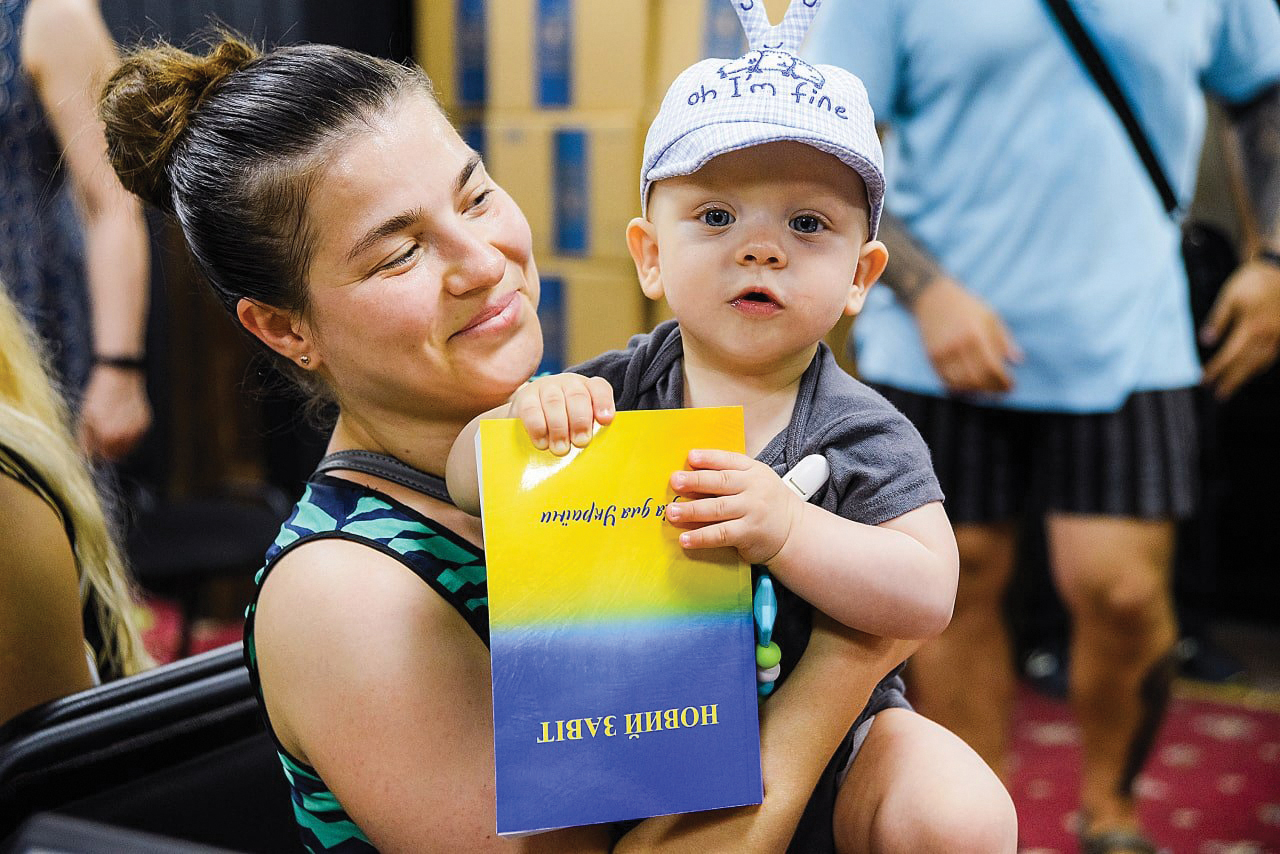
Ukrainian families receive New Testaments.
In Slovakia, as soon as Jerry and Susan Hamann received word from their local church that the invasion had begun and Ukrainians were on the way, they prepared beds and purchased groceries to host Ukrainian families in their own home. Some families stayed multiple weeks.
“We look for opportunities to encourage Ukrainians that, even in the midst of great tragedy and total insecurity, we can hope in the God who never changes and who takes evil and uses it for good,” they share.
As the Ukraine crisis continues, the network of ABWE ministries serving refugees remains committed to practically demonstrating Christ’s love. These efforts are mirrored in other locations throughout Europe: Moldova, Bosnia, Germany, Spain, and more. Missionaries and local churches daily exemplify Paul’s instruction to “rejoice with those who rejoice and weep with those who weep” (Romans 12:15). They pray for peace and changed lives despite chaos, often echoing, “We hate the reason for it and still rejoice at what God is doing.”
Through the Ukraine Crisis Fund, ABWE missionaries and partners have:
- Served more than 25,000 refugees
- Purchased more than 800 beds
- Equipped 28 convoy trips into Ukraine
- Provided more than 60,000 meals
- Given more than 1,200 gospel presentations
- Supplied more than 4,500 liters of fuel for national partners
- Distributed 3,500 books and pieces of gospel literature
